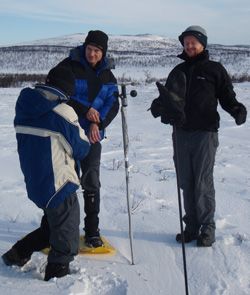 Success hasn´t come as a surprise to Otso Suominen, Station Manager of the Kevo Research Station.
Success hasn´t come as a surprise to Otso Suominen, Station Manager of the Kevo Research Station.- The project has worked well from the start. It has intensified the use of the research stations and publicized them more, Suominen says.
The Arctic research is increasingly important, because the Arctic's climate is changing faster than climate elsewhere and the economic and political interest on arctic areas are rapidly increasing. The INTERACT project offers increased opportunities for the new communities of researchers to access to Arctic research stations. Since the Arctic is vast and sparsely populated, international cooperation in environmental observation is in a key role.
- We are creating mutual codes of conduct and common standards for measurements. Interoperability of measurements and comparability of research results are of course essential, Suominen says.
- Research groups from five different countries have already visited Kevo Research Station in Lapland and we have stated new research projects together, he continues.
Transnational access program of INTERACT provides funding for travel and subsistence to 20 INTERACT research stations for research groups from EU countries and associate states (outside the station operating country) based on open calls for proposals reviewed by an international expert board.
Greenhouse Gas, Ice and Animals in Focus
INTERACT is a multidisciplinary project and scientists from the fields of biology, geology, glaciology, permafrost, climate, ecology and biodiversity are involved. For example, researchers measure greenhouse gas, flood and ice levels and vegetation.
- We all benefit from each other´s strong areas. The Kevo Research Station has specialized in the research of tree line areas, palsas and subarctic mountain birch zone. We have also got to offer a long experience, since the research station has operated for over fifty years, Suominen says.
The four year INTERACT project will still continue for two and a half years. It belongs to the Seventh Framework Programme of the European Union and it is under the auspices of SCANNET, a network of 33 terrestrial field bases in northern Europe, Russia, US, Canada, Greenland, Iceland, the Faroe Islands and Scotland.
Additional information from the INTERACT website and the European Commission website
Text: Henna Borisoff
Photographs: Elina Vainio
University of Turku
